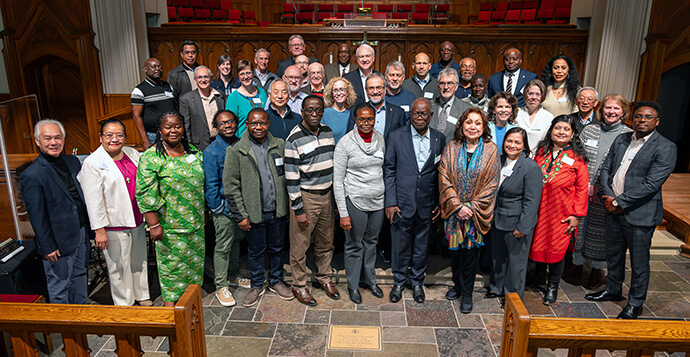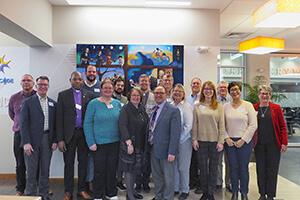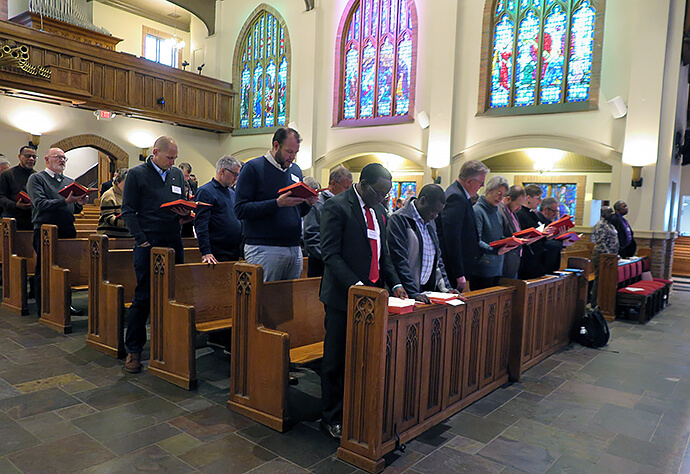Key points:
- United Methodist leaders are evaluating what portions of the Book of Discipline apply worldwide and what can be adapted in the church’s different geographic regions.
- At this point, the central conferences in Africa, Europe and the Philippines have the authority to adapt parts of the Discipline to their missional context.
- A constitutional-amendment package, called regionalization, would extend the same authority to the U.S.
- The work on the Discipline overhaul is not dependent on regionalization. But if regionalization is not ratified, what is deemed adaptable will still apply to the U.S. church.
United Methodist leaders from four continents are moving forward with a years-long effort to restructure the denomination’s main policy book.
They want to make clear what parts of the Book of Discipline are essentials that bind all United Methodists together and what parts can be adapted in the church’s different geographic regions.
For the longest time, this project has only involved determining what is adaptable in the denomination’s central conferences — eight church regions in Africa, Europe and the Philippines that each consist of multiple bodies called annual conferences. Under the denomination’s constitution, central conferences long have held the right to make “such changes and adaptations” to the Discipline’s administrative section as missional needs and differing legal contexts require.
Now, regionalization — a package of constitutional amendments up for a vote in annual conferences this year — potentially adds a new wrinkle to the work. Under regionalization, the central conferences and the church in the U.S. would each become regional conferences with the same authority to adapt the Discipline.
To be ratified, at least two-thirds of the total voters at this year’s annual conferences will need to support the measure. Bishops expect to announce the voting results in early November.
But regardless of whether regionalization is ratified, the work will continue to create a more globally relevant policy book — what leaders are calling a General Book of Discipline.
“It helps us to better understand the worldwide nature of the church,” Germany’s Bishop Harald Rückert said. “So even if the structures cannot follow at this point — because ratification fails — the thinking has changed to be a worldwide connection.”
Rückert is the chair of the 2025-28 Standing Committee on Central Conference Matters, which spent much of its organizing meeting Jan. 26-29 focused on reinvigorating its work on the Discipline overhaul. The meeting took place at the headquarters of the United Methodist Board of Global Ministries in Atlanta.
Ultimately, Rückert and other church leaders hope United Methodists ratify regionalization — which the standing committee developed alongside the Connectional Table and a grassroots group called the Christmas Covenant.
They also hope the 2028 General Conference will approve the standing committee’s recommendations for the General Book of Discipline. Without regionalization, the portions deemed adaptable will still apply in the United States.
The Rev. Nelly W. Wright, a new standing committee member from Liberia, said she felt blessed to be part of the discussion.
“People from all around the world are part of this group,” she said. “They have different understandings, different educational backgrounds, different cultural backgrounds. We are gathered together to come up with decisions that will lead our church.”

How the project began
General Conference, the denomination’s top lawmaking body, in 2012 assigned the standing committee to identify what in the Discipline truly applies around the globe. The committee is the only denomination-wide body where a majority of members live outside the U.S.
Committee begins theological work

The United Methodist Committee on Faith and Order is one of the bodies helping to develop the General Book of Discipline. The committee is responsible for guiding the denomination in informed theological reflection and discernment.
The committee, whose members include United Methodist scholars and ecumenical leaders from around the globe, has additional tasks assigned by last year’s General Conference. The group met together immediately before the Standing Committee on Central Conference Matters’ meeting in Atlanta to do its work.
The goal is to make the policy book — and United Methodist Church governance in general — less U.S.-centric.
Since 2012, the standing committee has been working with members of other denominational leadership bodies to comb through the Discipline. Both in 2016 and last year, the standing committee provided drafts to General Conference delegates and sought feedback from annual conferences across the connection.
Last year’s General Conference gave the mandate for the effort to continue. The legislative assembly also gave the standing committee permission to propose changes to the Discipline’s language where needed for more global resonance.
Retired Bishop Patrick Streiff, who was the standing committee’s chair when the work began, told the church leaders meeting in Atlanta that their job is to decide what in the Discipline deals with matters that are “distinctively connectional.”
“General Conference has the authority on everything that is distinctively connectional,” he said. “But what does that mean? Is it the whole book that General Conference edits? Really? Or is there a way that some of these things are adaptable in different regions?”
Determining what is really connectional and applicable worldwide, he said, will require “a lot of listening to each other and our different cultures and situations.”
Streiff’s hope is that the work will result in a General Book of Discipline that is much slimmer and easier to understand and translate than what The United Methodist Church has now. He also hopes the new Discipline will contain fewer redundancies and repeated requirements using the word “shall.”
“It will create a covenant of who we want to be together instead of all these detailed rules and innumerable ‘shalls,’” he told those gathered in Atlanta.

What’s under discussion
General Conference already has determined that certain parts of the Discipline absolutely are not adaptable. Changing these provisions requires at least General Conference action and possibly annual conference action, too.
The nonadaptable parts, listed in the Discipline’s Paragraph 101, are:
- The Constitution
- Doctrinal Standards and Our Theological Task
- The Ministry of All Christians
- The Social Principles.
Altogether, that makes the first 147 pages of the new 2020/2024 Discipline non-adaptable.
That still leaves the Book of Discipline’s Part VI, Organization and Administration. At 663 pages, Part VI is the biggest section in the denomination’s policy book.
To decide what’s adaptable, the standing committee has worked with three other denominational leadership bodies — the Committee on Faith and Order, the Ministry Study Commission and the Connectional Table.
Much of what the leaders are doing is going through Part VI’s paragraphs one by one to see what can be adapted in local contexts. Whatever they deem adaptable, they propose moving to a new Part VII in the Book of Discipline. This new part of the Discipline would still be required in the United States should regionalization not be ratified.
But if regionalization is ratified, Rückert suggested the standing committee might ask General Conference not to include the new Part VII in the Discipline. Instead, the Part VII would become simply a blueprint for regional conferences’ own Regional Books of Discipline.
“The question of whether or not the adaptable portions that we identify will be part of a global Book of Discipline or not, we can decide a little bit later,” Rückert told the standing committee. “The work still is very important.”
A new committee
Even if regionalization does not pass, last year’s General Conference approved a change in how the church deals with matters that relate solely to the U.S.
Subscribe to our
e-newsletter
The Discipline’s new Paragraph 507 details a new United States Regional Committee, which will act as a legislative committee during General Conference reviewing all petitions that pertain to the U.S. The committee will consist of all U.S. delegates elected to General Conference as well as a lay and clergy member from each central conference.
Its authority will be similar to that of the Standing Committee on Central Conference Matters, which also acts as a legislative committee during General Conference reviewing all petitions related to the central conferences.
Just as with the standing committee, anything the new U.S. Regional Committee supports will have to go before the full international General Conference plenary for approval.
“Without the ratification of regionalization, the U.S. will still depend on General Conference,” Rückert told United Methodist News. “They have to go through General Conference for everything, and I don’t think that they really want that.”
If a new U.S. Regional Conference is established with ratification, the U.S. Regional Committee will cease to exist.
Whatever happens, Dr. Glenn Paraso is among the United Methodists excited to see where work on a new more global Discipline goes. Paraso is a lay member of the standing committee and chief executive of the Mary Johnston Hospital in the Philippines.
“It’s like defining a new path in order to govern better,” he told UM News. “Hopefully, if we consider context and culture, because of our diversity, then maybe we can live into our ministries more. The U.S. will be the U.S. The Philippines will be the Philippines. And Africa will be Africa. So maybe our diversity will make us unite better.”
Hahn is assistant news editor for UM News. Contact her at (615) 742-5470 or newsdesk@umnews.org. To read more United Methodist news, subscribe to the free UM News Digest.




